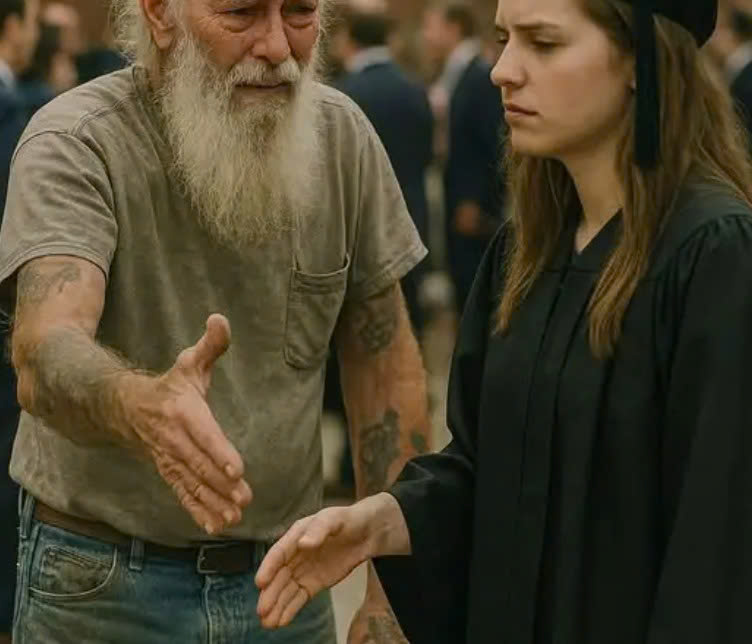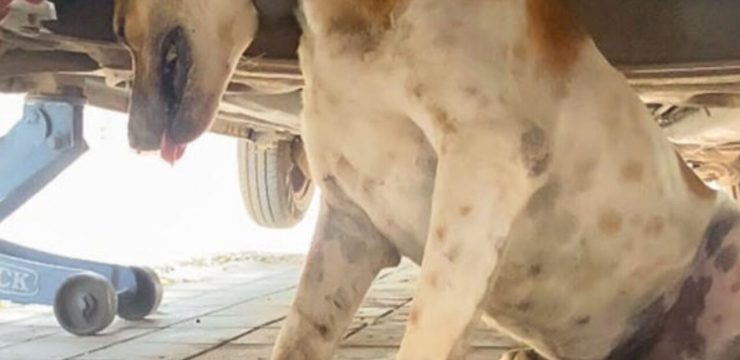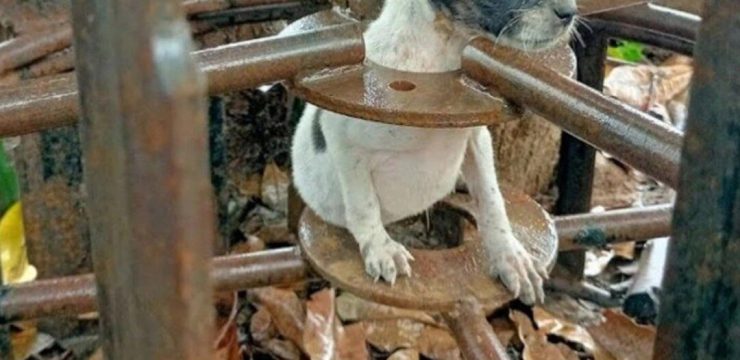Growing up, I never called Frank “Dad,” even though he was my father. I created that distance on purpose, building a wall I thought would protect me from the embarrassment I felt. Frank worked as a motorcycle mechanic, and for reasons that now seem painfully shallow, I hated that he wasn’t a doctor or a lawyer like so many of my friends’ parents. Their fathers wore crisp suits and ties, drove polished cars, and looked like they belonged on magazine covers. Frank, meanwhile, wore a black leather vest stained with oil and smelled faintly of gasoline. Every time he picked me up from school on his Harley, I prayed no one would see me climb onto the back. I treated his blue-collar pride as if it were something to be ashamed of.

On the day of my graduation, he tried to meet the occasion halfway. He arrived in his one pair of decent jeans and a button-up shirt, the sleeves pushed up just enough to reveal the faded tattoos on his forearms. He smiled when he saw me—his whole face softened. But instead of letting him hug me, I stepped back and extended my hand for a formal handshake. At the time, I told myself it was the mature thing to do, a boundary I needed to set. I couldn’t have known that moment would replay in my mind for years, becoming one of the deepest regrets of my life.
A few weeks later, everything changed. I received a phone call telling me that Frank had been traveling through a mountain pass when a logging truck drifted out of its lane. His bike was struck, and he didn’t survive the accident. Hearing the news felt surreal, like someone had pressed pause on my world. As much as I had pushed him away, losing him so suddenly left an ache I didn’t know how to name.
When I returned to our small hometown for the funeral, I expected the service to be modest. Maybe a few neighbors, perhaps one or two friends from the shop—nothing more. But when I arrived at the church, my breath caught in my throat. Hundreds of bikers had gathered, traveling from six different states to honor him. Their leather vests were adorned with small orange ribbons. One woman I didn’t recognize walked up to me, touched the ribbon on her vest, and said quietly, “Your father’s favorite color.”
Inside the church, person after person stood up to share stories about the man they all called “Brother Frank.” They talked about how he organized community fundraisers for children battling illness, how he rode through snowstorms to deliver medicine to elderly neighbors who had no one else, how he helped people even when no one was watching. A man with tears streaming down his face stood up and described how Frank had pulled him from a ditch one icy night and refused to leave until he agreed to get help. That man was now six years sober, and he credited his entire recovery to Frank’s persistence and compassion.
This was the man I had been embarrassed of.
After the service, a lawyer approached me and handed me a worn leather satchel. “Your father wanted you to have this,” he said. Inside the satchel was a stack of papers tied together with Frank’s old orange bandana, a small box, and a letter addressed to me. My hands shook as I opened it.
In the letter, Frank gently acknowledged that he knew I had been embarrassed by his work. But instead of expressing anger or disappointment, he reminded me that what truly matters in life is not the title someone holds but the number of people they help along the way. He left me his Harley and wrote that if I didn’t want it, I should give it to someone who could use it. He encouraged me never to be ashamed of who I am or where I come from. The final lines said simply—and heartbreakingly—how much he loved me.
It was the first time I cried since I’d heard about his passing.
Among the papers in the satchel were donation receipts—dozens of them. One showed that over the course of fifteen years, Frank had donated $180,000 to different charities and people in need. He never told anyone, not even me.
The next morning, I visited his motorcycle shop. Samantha, the woman who had worked beside him for years, greeted me with a warm smile and a cup of fresh coffee. “He told me you’d come today,” she said. Then she handed me a folder. “Your dad started a scholarship last year. He named it the Orange Ribbon Grant, after his bandana. He wanted you to choose the first student.”
I felt my throat tighten. Frank—the man I had pushed away, the man I had judged without truly knowing him—had built a legacy far larger than I ever realized. With Samantha’s help, I eventually learned to ride the Harley I once despised. And with the money he left me, I created a program to teach local kids how to repair bikes so they could work in the shop someday. I didn’t want the place he built to disappear.
Later, I learned something else that shattered every assumption I’d ever made about him. Years ago, Frank had been offered a high-paying job as a mechanic in a major city, but he turned it down. My mother—who passed away when I was eight—had been battling leukemia at the time. He refused the job because he needed to be close to her. He chose family over ambition, love over accolades.
My father was never lacking drive. He simply had different priorities—ones I was too young and too arrogant to understand. I once resented him for not being the kind of father I thought I wanted. Now, I wish I could go back and tell him how proud I am to be his son.





